Jerry Z. Muller Quotes & Sayings
Enjoy the top 12 famous quotes, sayings and quotations by Jerry Z. Muller.
Famous Quotes By Jerry Z. Muller
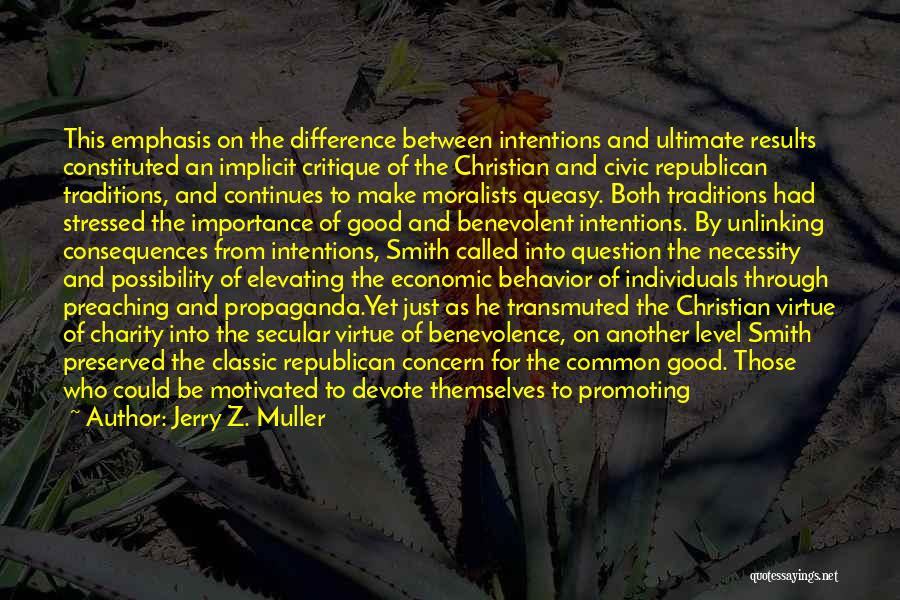
This emphasis on the difference between intentions and ultimate results constituted an implicit critique of the Christian and civic republican traditions, and continues to make moralists queasy. Both traditions had stressed the importance of good and benevolent intentions. By unlinking consequences from intentions, Smith called into question the necessity and possibility of elevating the economic behavior of individuals through preaching and propaganda.
Yet just as he transmuted the Christian virtue of charity into the secular virtue of benevolence, on another level Smith preserved the classic republican concern for the common good. Those who could be motivated to devote themselves to promoting the public interest were in need of superior reason and understanding, by which we are capable of discerning the remote consequences of all our actions, and of foreseeing the advantage or detriment which is likely to result from them. — Jerry Z. Muller
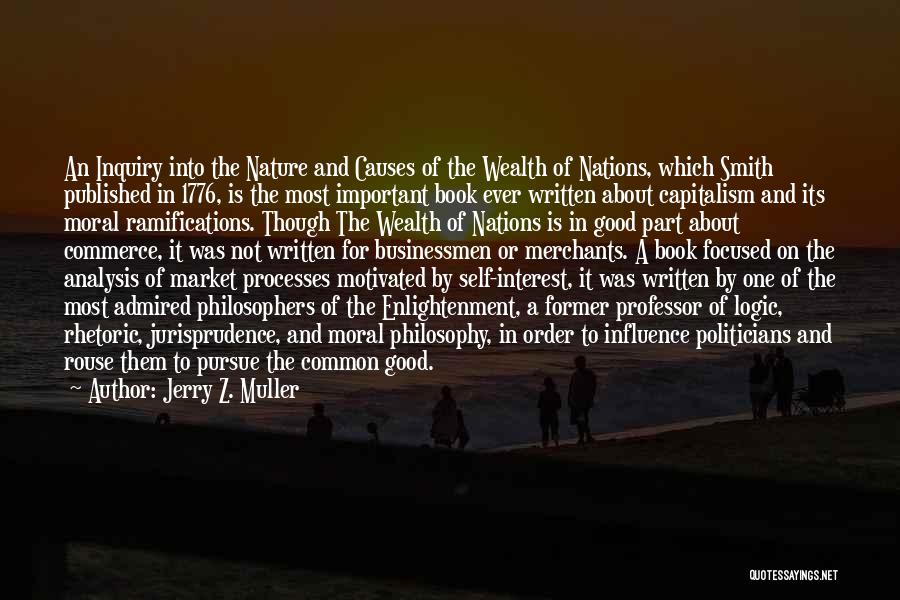
An Inquiry into the Nature and Causes of the Wealth of Nations, which Smith published in 1776, is the most important book ever written about capitalism and its moral ramifications. Though The Wealth of Nations is in good part about commerce, it was not written for businessmen or merchants. A book focused on the analysis of market processes motivated by self-interest, it was written by one of the most admired philosophers of the Enlightenment, a former professor of logic, rhetoric, jurisprudence, and moral philosophy, in order to influence politicians and rouse them to pursue the common good. — Jerry Z. Muller
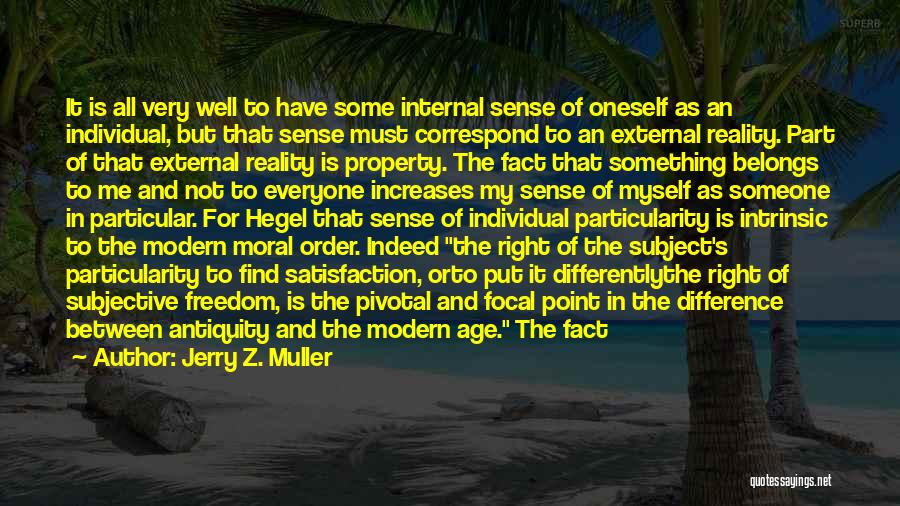
It is all very well to have some internal sense of oneself as an individual, but that sense must correspond to an external reality. Part of that external reality is property. The fact that something belongs to me and not to everyone increases my sense of myself as someone in particular. For Hegel that sense of individual particularity is intrinsic to the modern moral order. Indeed "the right of the subject's particularity to find satisfaction, or
to put it differently
the right of subjective freedom, is the pivotal and focal point in the difference between antiquity and the modern age." The fact that others do not take my property
that they regard it as mine
is also a way in which they recognize me as an individual. It is precisely this recognition that the slave, the bondsman, and the serf lack. That the right to own private property, to control some corner of the world, is universal in the modern state is for Hegel part of its glory. (p. 155) — Jerry Z. Muller
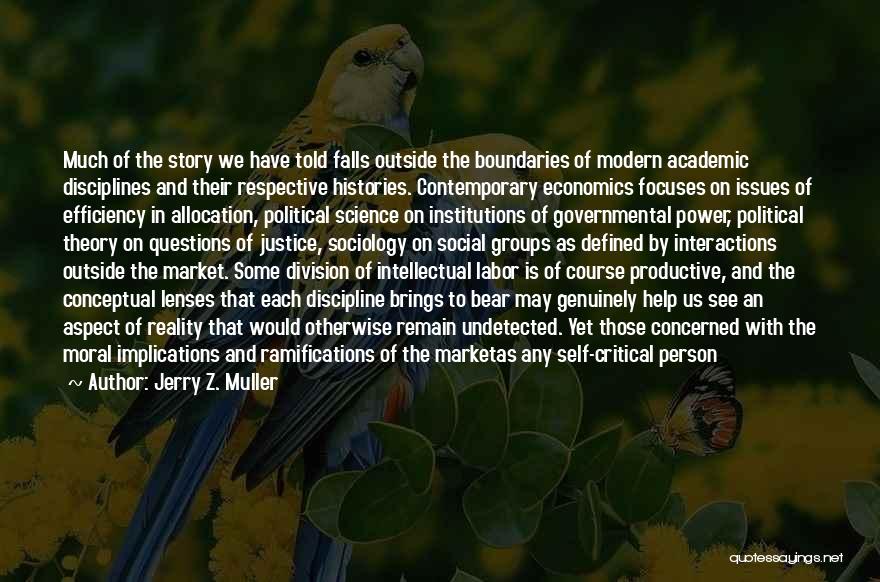
Much of the story we have told falls outside the boundaries of modern academic disciplines and their respective histories. Contemporary economics focuses on issues of efficiency in allocation, political science on institutions of governmental power, political theory on questions of justice, sociology on social groups as defined by interactions outside the market. Some division of intellectual labor is of course productive, and the conceptual lenses that each discipline brings to bear may genuinely help us see an aspect of reality that would otherwise remain undetected. Yet those concerned with the moral implications and ramifications of the market
as any self-critical person in modern society ought to be
get a very skewed picture when they view it through only one of these lenses. Seeing the market with the added perspectives offered by the thinkers treated here provides us with a richer and more rounded view. — Jerry Z. Muller
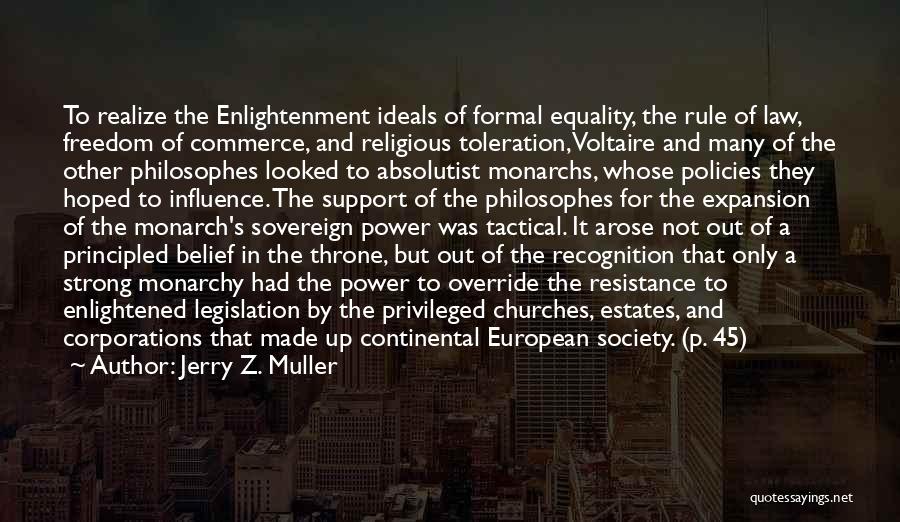
To realize the Enlightenment ideals of formal equality, the rule of law, freedom of commerce, and religious toleration, Voltaire and many of the other philosophes looked to absolutist monarchs, whose policies they hoped to influence. The support of the philosophes for the expansion of the monarch's sovereign power was tactical. It arose not out of a principled belief in the throne, but out of the recognition that only a strong monarchy had the power to override the resistance to enlightened legislation by the privileged churches, estates, and corporations that made up continental European society. (p. 45) — Jerry Z. Muller
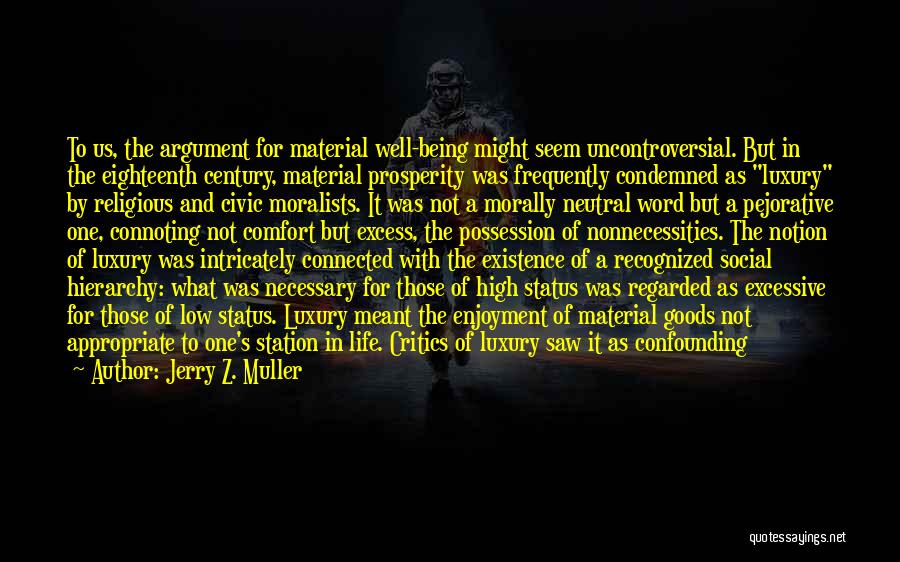
To us, the argument for material well-being might seem uncontroversial. But in the eighteenth century, material prosperity was frequently condemned as "luxury" by religious and civic moralists. It was not a morally neutral word but a pejorative one, connoting not comfort but excess, the possession of nonnecessities. The notion of luxury was intricately connected with the existence of a recognized social hierarchy: what was necessary for those of high status was regarded as excessive for those of low status. Luxury meant the enjoyment of material goods not appropriate to one's station in life. Critics of luxury saw it as confounding social ranks. P. 40 — Jerry Z. Muller
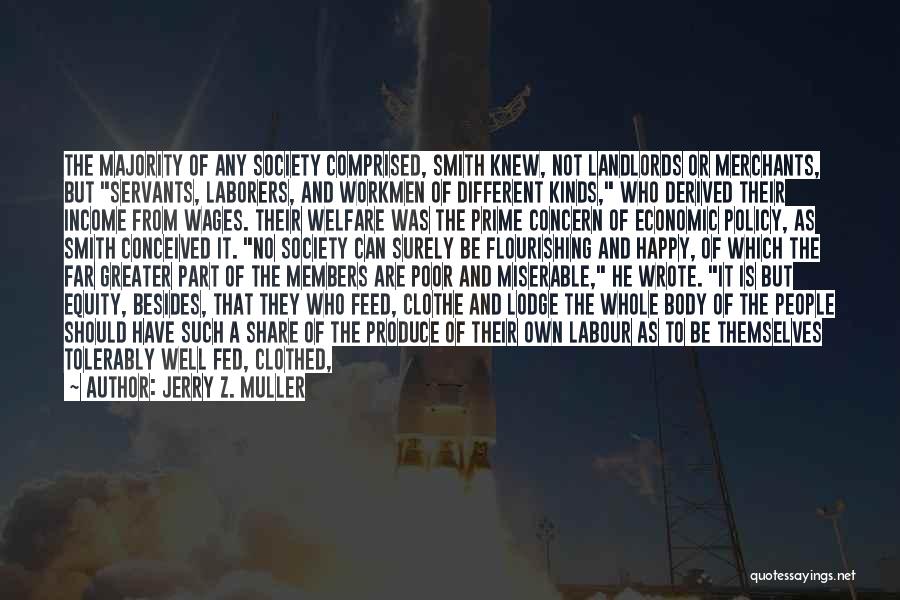
The majority of any society comprised, Smith knew, not landlords or merchants, but "servants, laborers, and workmen of different kinds," who derived their income from wages. Their welfare was the prime concern of economic policy, as Smith conceived it. "No society can surely be flourishing and happy, of which the far greater part of the members are poor and miserable," he wrote. "It is but equity, besides, that they who feed, clothe and lodge the whole body of the people should have such a share of the produce of their own labour as to be themselves tolerably well fed, clothed, and lodged." The chief economic concern of the legislator, in Smith's view, ought to be the purchasing power of wages, since that was the measure of the material well-being of the bulk of the population. (p. 64) — Jerry Z. Muller
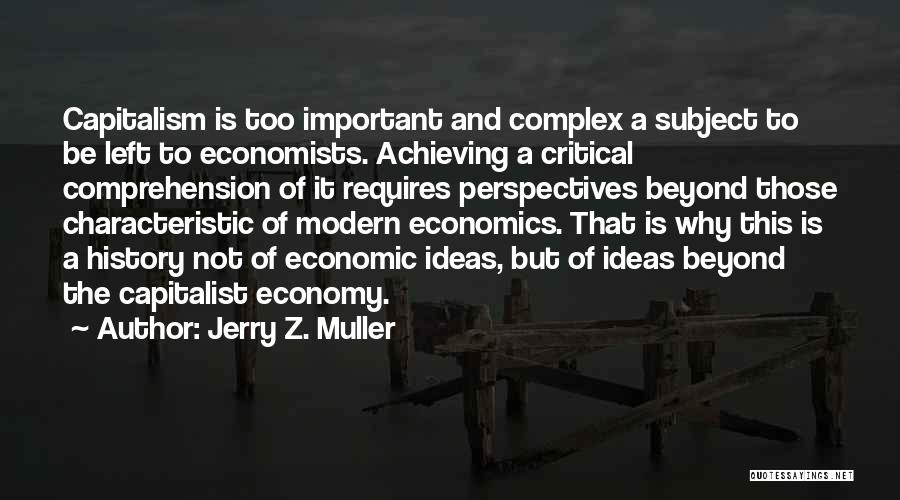
Capitalism is too important and complex a subject to be left to economists. Achieving a critical comprehension of it requires perspectives beyond those characteristic of modern economics. That is why this is a history not of economic ideas, but of ideas beyond the capitalist economy. — Jerry Z. Muller

It was in the eighteenth century that England became what (Adam) Smith called "a nation of shopkeepers" ... (p. 58) — Jerry Z. Muller
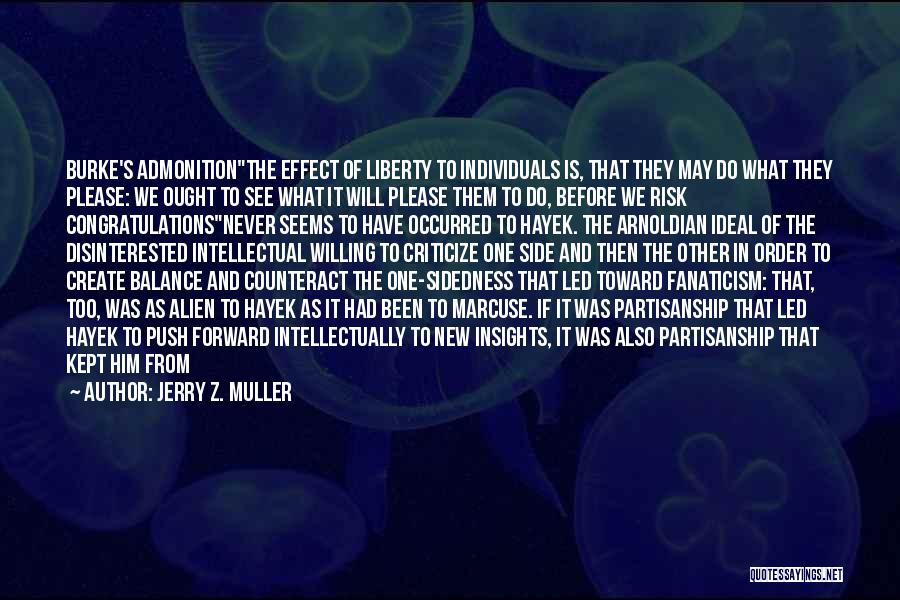
Burke's admonition
"The effect of liberty to individuals is, that they may do what they please: We ought to see what it will please them to do, before we risk congratulations"
never seems to have occurred to Hayek. The Arnoldian ideal of the disinterested intellectual willing to criticize one side and then the other in order to create balance and counteract the one-sidedness that led toward fanaticism: That, too, was as alien to Hayek as it had been to Marcuse. If it was partisanship that led Hayek to push forward intellectually to new insights, it was also partisanship that kept him from a balanced and rounded philosophy.
Perhaps a familiarity with "the best that has been thought and said" about the market will aid us in obtaining a more disinterested and informed perspective. Such a perspective might well begin with Hayek's insights. But it would by no means end with them. p. 387 — Jerry Z. Muller

For Burke, almost everything that makes life worthwhile is a result of society, its inherited codes, knowledge, and institutions. These goods are fragile, and when they are destroyed, the result is human misery ... Among the greatest of man's needs, according to Burke, was the need for society and government to provide "a sufficient restraint upon their passions." As far back as his Vindication of Natural Society, Burke had argued that the destruction of inherited institutions and cultural practices would result not in natural harmony, but in barbarism. For Burke, as for Adam Smith, man is preeminently social man who realizes himself morally only under the tutelage of society. (p. 131) — Jerry Z. Muller
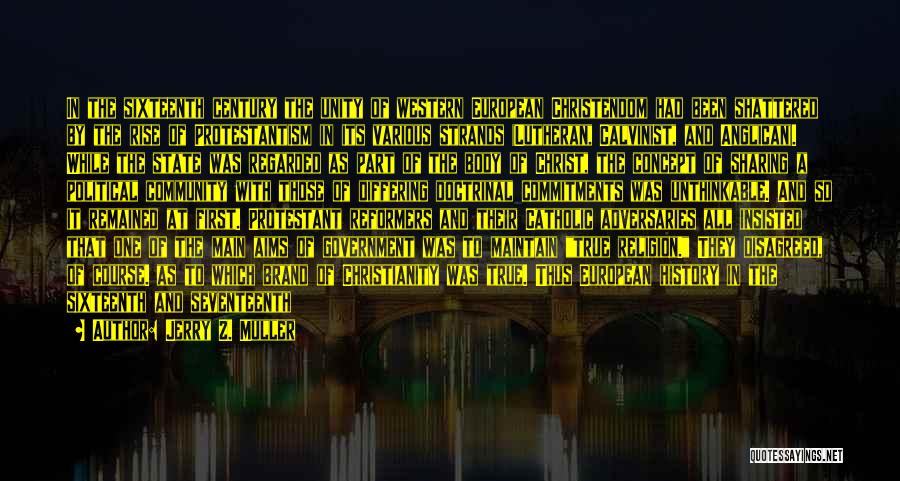
In the sixteenth century the unity of western European Christendom had been shattered by the rise of Protestantism in its various strands (Lutheran, Calvinist, and Anglican). While the state was regarded as part of the body of Christ, the concept of sharing a political community with those of differing doctrinal commitments was unthinkable. And so it remained at first. Protestant reformers and their Catholic adversaries all insisted that one of the main aims of government was to maintain "true religion." They disagreed, of course. as to which brand of Christianity was true. Thus European history in the sixteenth and seventeenth centuries became a chronicle of civil war, of massacre, and of the expulsion of religious minorities. The notion of religious toleration grew less out of any particular brand of Christianity than out of the fear and frustration of protracted civil war. (p. 24) — Jerry Z. Muller





